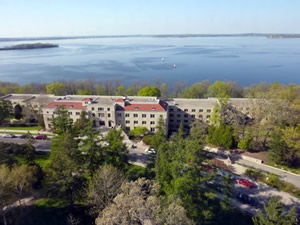Better Hand Cleaner for a Happier Campus

PHOTO © JAMES STEAKLEY
Changing to the Deb Stoko Refresh PureBac FOAM allowed
the University of Wisconsin-Madison to realize numerous
benefits, including a $5,000 annual savings in the housing
department skin care costs, given the optimal shot size and
a better cost-in-use of the Deb products.
FOR 168 YEARS, the University
of Wisconsin-Madison (UW
Madison) has served as a public
land-grant university and research institution.
With more than 7,500 students who live
in its 27 residence halls, the university implemented
a campaign to promote hand hygiene
across its residence halls to improve student
health and reduce class absenteeism.
“Infectious diseases can spread quickly
on any college campus, but proper handwashing
with soap and water is one of the
most important steps students can take to
avoid getting sick and spreading germs to
others,” says Jodi Krause, assistant director
of Housekeeping at the university.
UW Madison was using a commercial
foaming hand soap, but wanted an effective
and economical product for its 600 bathrooms
to improve student health.
“We’re always looking for ways to improve
our campus, so we were intrigued when we
were introduced to Deb,” says Krause.
In 2015, UW Madison replaced its hand
cleanser with Deb Stoko Refresh™ PureBac
FOAM in all of the resident and staff bathrooms
in its 27 residence halls because of
its effectiveness in infection prevention.
“We tried the Deb foam in a resident hall
and the students and staff liked it a lot better
than our previous hand cleanser, so we decided
to implement university wide,” says Krause.
The Deb foam helps to maintain the natural
acidic protective mantle, whose function
includes protecting the skin from bacterial
and fungal infection. Its perfume- and dye-free
formula reduces the potential for allergic
reaction and skin irritation and is ideal for
people who are sensitive to fragrances.
“We like the Deb foam because there’s no
dye or fragrance to it so it doesn’t leave behind
a sticky residue,” said Krause. “It also doesn’t
dry out your hands like our previous product.”
www.debgroup.com/us